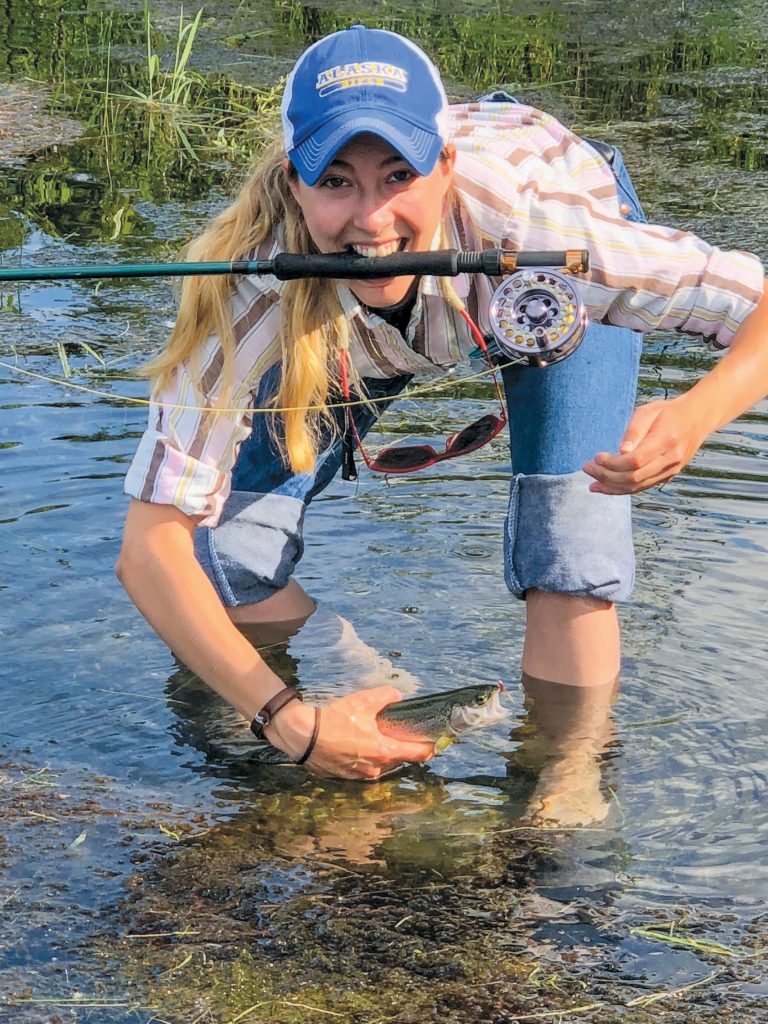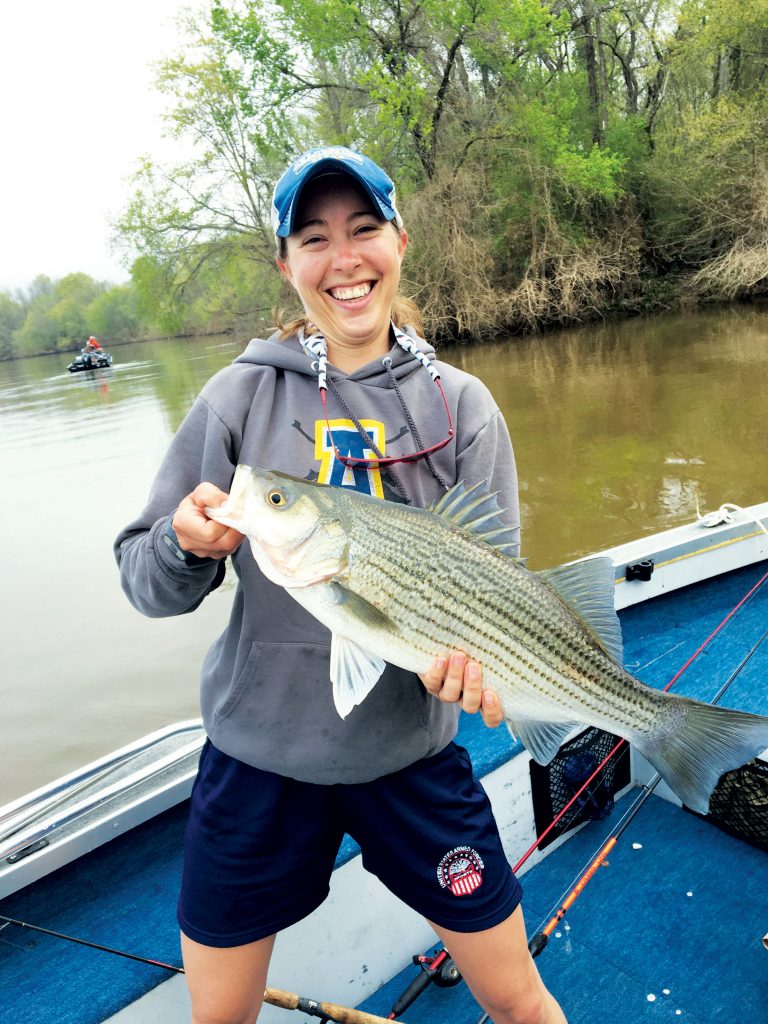Taking Aim in Tokyo
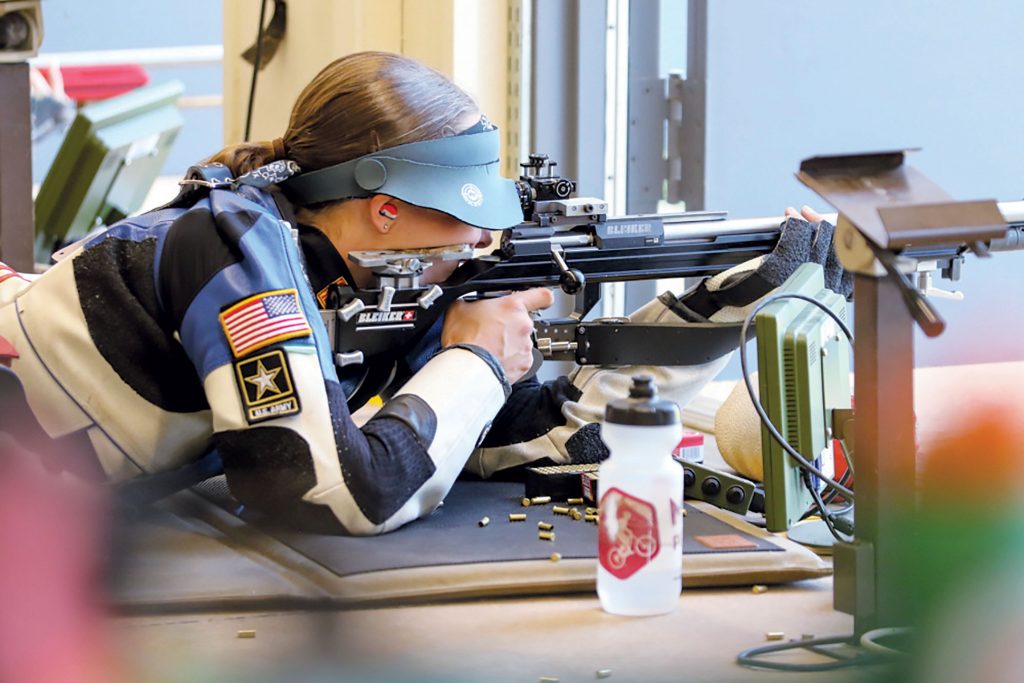
year. The world-class shooter who also loves to fish has qualified for the three-position rifle event at
the Tokyo Summer Olympics, which begin this month.
(MICHELLE LUNATO/U.S. ARMY/SAGEN MADDALENA)
Sagen Maddalena’s dad taught her about fly fishing in remote Sierra rivers, streams and lakes. Her experience with the local 4-H club taught her about patience and leadership. And her grandfather taught her how to shoot firearms safely and effectively.The result? A college education, military career and now, a spot on the U.S. Olympic shooting team and a trip to Tokyo this month.Maddalena, 27, and a specialist in the U.S. Army, qualified for the Summer Olympics in the three-position rifle event after coming up just short in 2016 qualifying attempts.
“Wearing the red, white and blue, that’s going to be where my thoughts are,” she says. “It’s a privilege and an honor, and definitely I’m excited to represent the Army, my state, my family.”It’s been quite a ride for Maddalena, who can point to her hectic but fulfilling childhood growing up in the mountains of rural Tuolumne County. She raised livestock, participated in a 4-H-sponsored rifle program, and was proficient enough to get recruited into a statewide service rifle team that ultimately led to an All-American shooting career in college.Rising all the way to Olympian status has made the journey even more satisfying.“(It’s) kind of like putting on that Army uniform. It makes you pop your chest a little more, bring your shoulders out and chin up,” she says of repping her country at the COVID-19-delayed Tokyo games, which are scheduled to begin on July 23. “It’s like, ‘OK. Now I get to go to work. I get to show who I am among the greatest out there.’”
THE SIERRA COMMUNITY OF Groveland (population just over 600) is known as the “gateway” to Yosemite National Park, and it was an outdoor paradise for young Maddalena, who was born in Woodland, 15 miles northwest of Sacramento.Her dad Randy got her hooked on fly fishing, a passion that continues today, whether back home in California, in Alaska, where she competed on her college rifle team, or in Georgia, where Specialist Maddalena is stationed at Fort Benning.“My dad got me into fly fishing and I did a lot of that on the Tuolumne River, the North Fork, and just getting out on the woods; I loved that,” she says. “And hunting? Not so much. I did get out. I had a deer tag. I’ve had a bear tag. But I think I was attracted more to the fishing aspect of it.”Fly fishing with Randy was a chance to take in the spectacular wilderness surrounding her home.
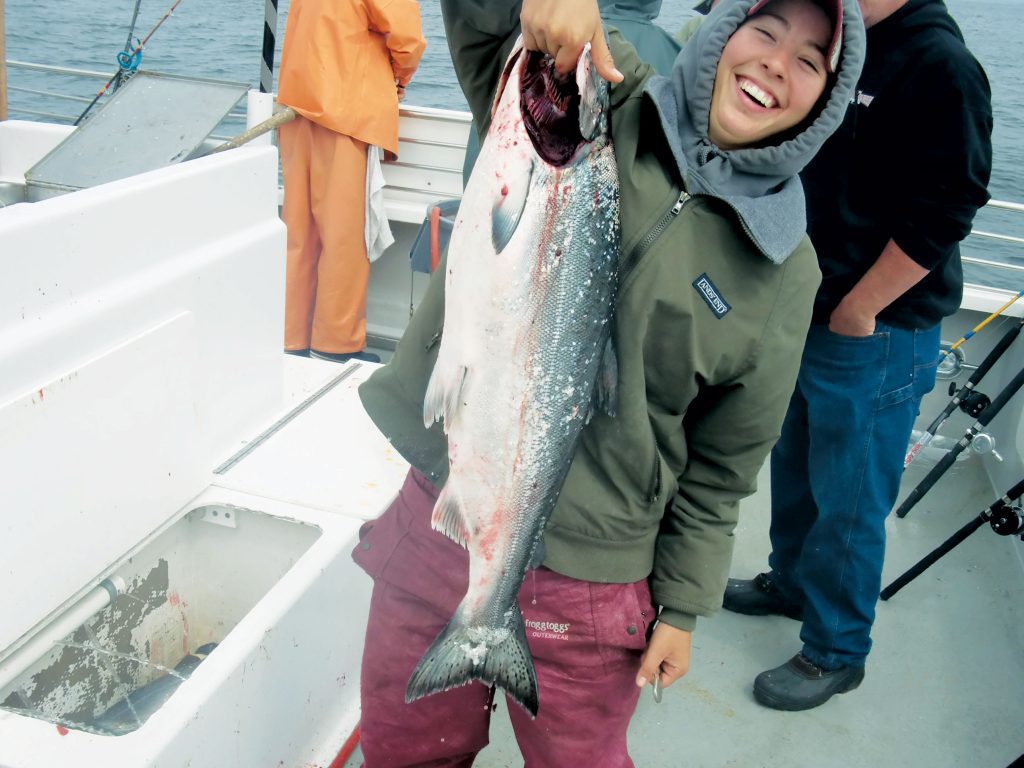
California king salmon,
first got started in shooting
while participating in a 4-H
club program, which led
to an invite from a service
rifle team, the California
Grizzlies.
(SAGEN MADDALENA)
Father and daughter would hike the Sierra and end up at pristine, sparsely fished spots where they could have the trout to themselves.Maddalena has so many memories of those days that she had to think about one that stood out.“I was with my dad and we went to a glacier lake that had browns. And it was up above Tioga Pass, above Lake Eleanor and Saddlebag Lake. It was a 10,000-foot lake and you started to hike, got above the tree line and you kept going up. And I did catch a few little browns,” she says.“But the beauty of it and just being able to get out there and the freedom of it and the ability to fish – just way up there in the sky – that’s a memory that always comes back. Especially doing that with my dad and going on that big, long hike, just being out there and doing some fishing on our own, was peaceful.”It was another family member who inspired her in a different activity that, like fly fishing, became an obsession.“A big part of it goes to my grandpa. He kind of got me out there shooting and he showed me a lot of the safety part of it and the enjoyment of it,” she says. Young Sagen joined her local 4-H club and participated in the traditional raising of livestock.
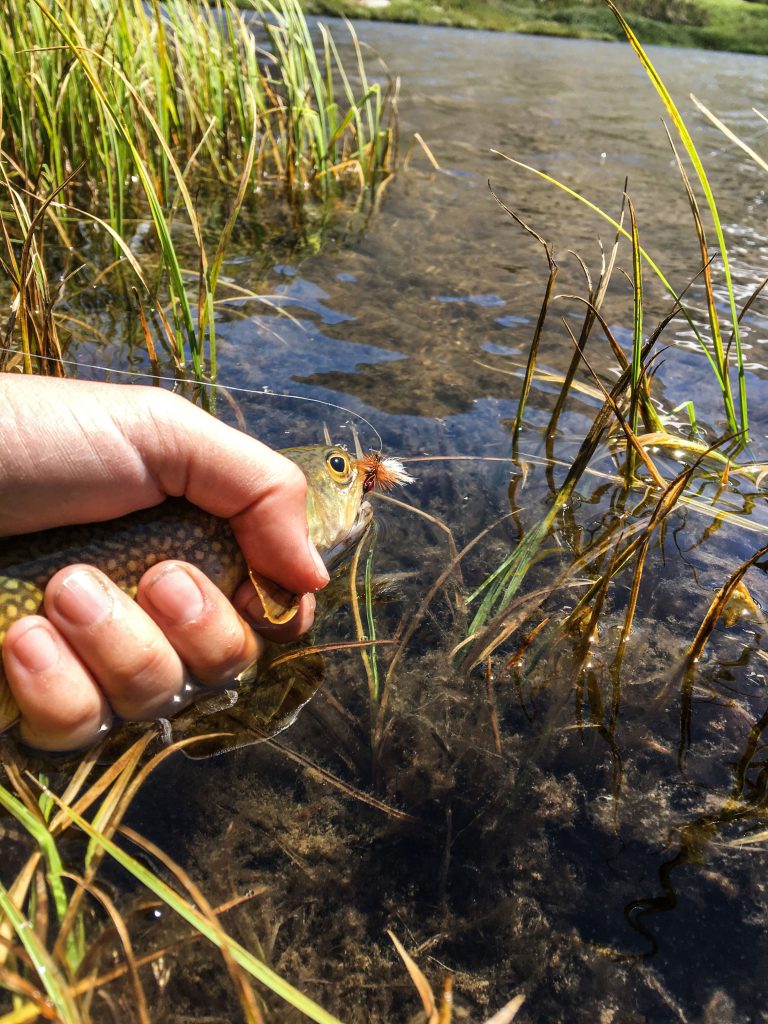
her dad Randy were the norm for Maddalena,
who sees correlations between fly fishing and
shooting. “It’s the patience and the ability to
just kind of be all there when you’re doing it,”
she says. “You really can’t just let your mind
wander.”
(SAGEN MADDALENA
She started with sheep, then pigs, and she especially got into taking care of breeding goats.“My family owned horses so, of course, I did the showmanship and the equestrian aspect of it. And the first animal that I raised in livestock was a sheep. That was an experience,” she says. “From sheep I raised a pig or two. That was a blast. But I got into goats and I actually started to raise them. They had kids and did the whole thing. And I had a small business. I actually had to make a choice between shooting and raising goats. So 4-H opened a lot of doors.”Indeed, 4-H also sponsored a .22 long rifle shooting program that Maddalena was excited to enroll in. It was mostly a safety class with some competitive events that Sagen got literally fired up to excel in. “The big thing was, a junior service rifle team (the California Grizzlies) ran that program, or assisted in running that program,” she says. “It was kind of like a football team and they recruited juniors who were interested in shooting. ‘OK, I want to go a little further in this.’”Maddalena found herself competing – and holding her own – against older 4-H competitors. And then the invite came to join the California Grizzlies service rifle team.“Once I went to my first match there, I was hooked at that point,” she says.Still, as she was mostly home-schooled, Maddalena wasn’t sure if shooting could turn into something else. She wanted to enlist in the Army eventually, but preferred to get a college education first. That’s when her service rifle coach, Robert Taylor, had an idea that would change everything.
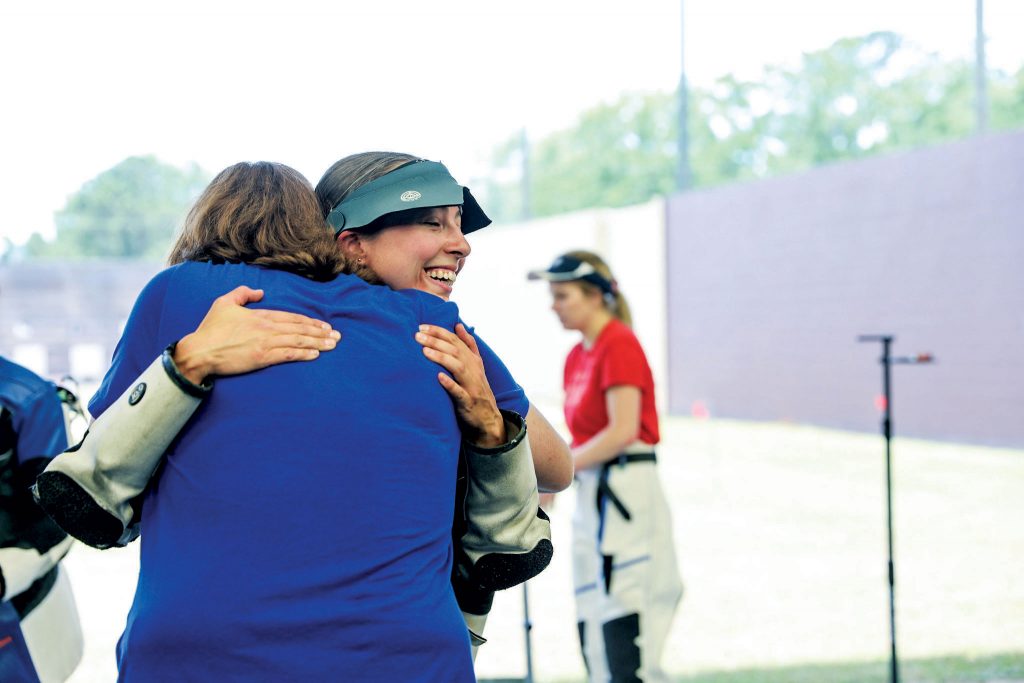
the 2016 Rio de Janeiro games. “Just to make the team, that’s kind of like a ticket to
the dance, right? It’s only the first step,” she says.
(MICHELLE LUNATO/U.S. ARMY)
THE OLYMPIC GAMES TELL us so much about an athlete’s character – from Jesse Owens, the sprinter who stuck it to Adolph Hitler’s white supremacy rhetoric during the 1936 games in Berlin; to unlikely wrestling gold medalist Rulon Gardner; to the sheer dominance of gymnastics star Simone Biles. Maddalena may or may not join that select group as American gold medal heroes, but she found humor when asked about how quickly she caught onto shooting given how far she’s progressed since.“Not at all. Terrible,” was how she described her performance early on. “One thing that still sticks in my mind is the (4-H) instructor we had running the .22 program told everybody in the group in our lesson before we went to the range – and he was talking to me – was, to be able to shoot standing, you have to love standing. So I pretty much told myself from that time on, ‘I love shooting standing.’”So she made sacrifices to get better. Between her practice time on the range and livestock duties, Maddalena admits she had little time to do what kids her age do and hang out with friends. She also credits her mom, Susan, for attending all those county fairs: “I’m pretty sure there were better things to do at that time,” Sagen says. “She sacrificed a lot to be there.”Sagen also was thankful Randy wasn’t a “helicopter dad.” He “never hovered” at events, nor got too involved in the proceedings.“It was my drive; it wasn’t their drive,” she says. “They were always just there to support, so I was fortunate to have that.”Maddalena was also inspired by her service rifle team coach Taylor, who offered some of the best advice of her life.“‘Look: You have a choice to make. You can be the best here; the best as a service rifle shooter,” Maddalena recalls Taylor telling her. “Or you can expand out and you can try shooting in college … You can (someday possibly) shoot in the Olympics and take your competitive nature out farther.”
The University of Alaska Fairbanks, one of the most storied rifle programs in the NCAA, checked a lot of boxes for a goal to strive for. The school also offered a program Maddalena wanted to major in (natural resources management), so together coach and athlete reached out to then Nanooks head coach Dan Jordan.“I told him I was interested, my experience and what I had under my belt, and I told him where I wanted to get to and the goals that I had,” Maddalena says. “I wrote it all out in an email and he gave me a call. He gave me a chance. He said, ‘You can come up here and compete as a walk-on.’”So with a borrowed .22 and an air rifle she purchased from summer job earnings, Sagen and her mom headed to Fairbanks, Alaska, to try out. Jordan liked what he saw. Maddalena made the team as a non-scholarship athlete and redshirted in the 2013-14 season.That time proved invaluable to watch her older Nanooks teammates in action at a prestigious program (UAF has won 10 NCAA team titles and finished second four more times). Match days meant Maddalena could watch the action from the sidelines. Then when it ended she’d stick around and get her own work in.“I’d watch them compete, shoot. They would pack up and leave and I would go on the range and shoot my match and be there until like 10 or 11 (p.m.) just shooting my match and seeing how I did amongst their scores. That’s how I pushed myself. They drove me to be better.”In her four years competing, Maddalena became an All-American in both air and smallbore rifle and earned her degree in natural resources management with a minor in forestry.She also immersed herself in the Alaskan lifestyle. Despite being a shooter, fishing was always Maddalena’s first love.
Though she vows to come back someday and catch a massive Alaska salmon, she caught plenty of grayling and trout during trips to waters near Fairbanks.“I remember going out to the Clearwater (River) and I was out there fly fishing. I was walking back to the truck and thought, ‘Wow. My feet are cold,’” she says. “I had the waders on and the thick socks. I was appropriately dressed. And I got back to the truck and was eventually able to unfreeze my shoelaces so I could get my shoes off. But I had a half-inch of ice underneath my socks built up.”It’s a feeling only an Alaskan – even a transplant from California – can truly appreciate. Maddalena savored her solo hikes when she packed her snowshoes and shotgun and headed out for some bird hunting.“I had a 12-gauge and I’d hunt for grouse for dinner. And my poor roommates; I’d sit on the back porch of our apartment and take the feathers out of the grouse,” she says with a laugh. “We had feathers all over the place. But that was my thing: just go out and start walking. ”As for her time in Alaska’s outdoors, Maddalena used the word clarity to describe the overall experience.“You’re so close to just, I want to say nature, but that’s not the right word for it. You get into the truck and drive somewhere and then get out and start walking,” she says. “And you’re just 30 minutes from town. You can look up in the sky and the color is a little more blue or a little more crisp. And I always really enjoyed that part of it. It’s just a different place.”
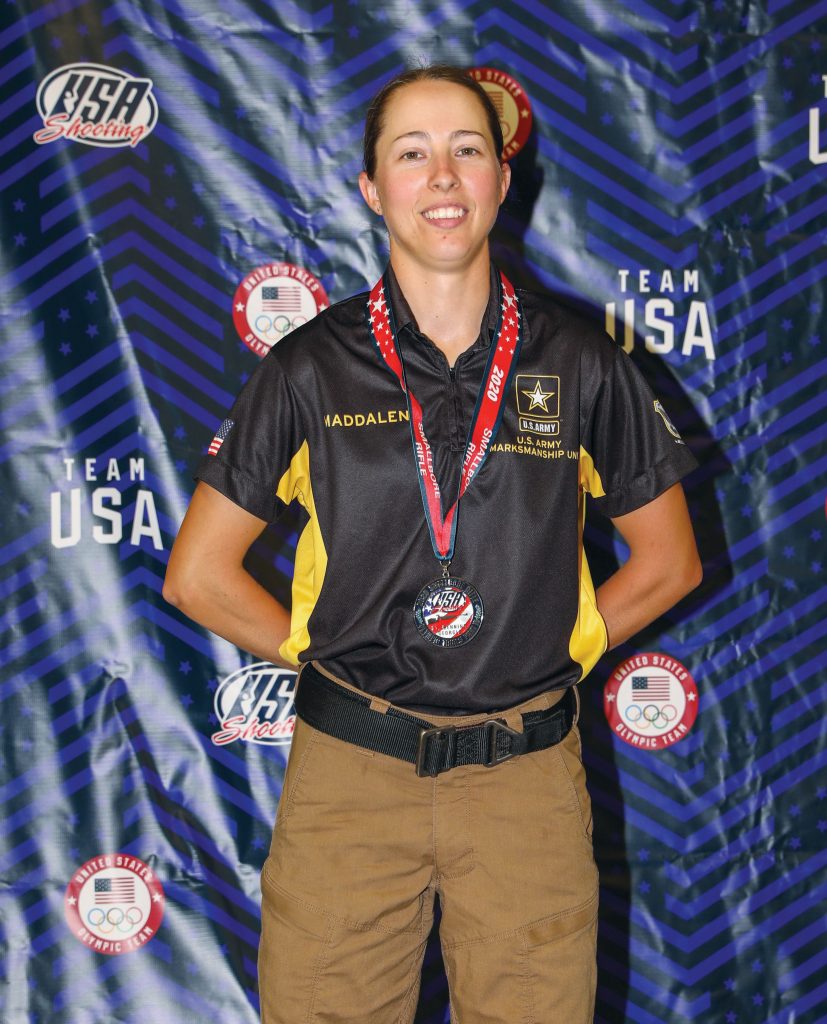
that Army uniform. It makes you
pop your chest a little more,
bring your shoulders out and
chin up,” Maddalena says of
representing Team USA in Tokyo.
“ It’s like, ‘OK. Now I get to go
to work. I get to show who I am
among the greatest out there.’”
(MICHELLE LUNATO/U.S. ARMY)
TOKYO MARKS AN ENDGAME to Maddalena’s journey from rural California to Japan via Alaska. All the 4-H lessons, the service rifle team success and her perseverance to make it work at the college level will come to fruition when she heads across the Pacific later this month.Specialist Maddalena loves her current career in the Army. When she’s not training – she missed out at 2016’s smallbore rifle Olympic Trials before joining teammate Mary Tucker as Team USA’s 2020 air rifle participants – Maddalena sometimes instructs young shooters and fellow soldiers as an Army International Rifle Team member.“It wasn’t anything that was in the family (as a military background). But I’ve always been patriotic, I guess. Just growing up and being in that rural community and always looked up to the sacrifices that soldiers gave,” she says. “I wanted to be a part of that, and so to have that opportunity to be a competitor and shoot nationally, to compete around the world and represent the Army and my country at the same time, that’s hands down a huge drive. A huge reason why I compete.”And what about that upcoming competition in Tokyo?“Just to make the team, that’s kind of like a ticket to the dance, right? It’s only the first step. However, it’s a step that can be hard to get to,” says Maddalena, who referred to her 2016 near-miss as a “taste.”“And now, having more than that taste and really getting it in my grasp and getting that ticket to go, it really doesn’t feel like anything special. It’s like, ‘OK. Now I get to go to work. I get to show who I am among the greatest out there.’” -CS

